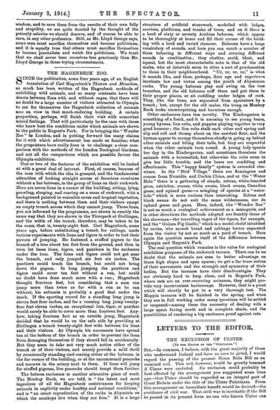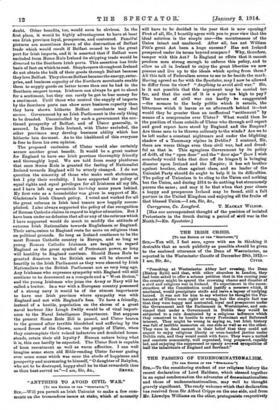LETTERS TO THE EDITOR.
THE EXCLUSION OF ULSTER
[To VW 'gyms 57 17II MPSCraTO."1
Sln,—In common, I believe, with the great majority of those who understand Ireland and have no axes to grind, I would regard the passing of the present Home Rule Bill as an unmixed eviL This evil, however, would be greatly lessened if Ulster were excluded. Its exclusion could probably be beet effected by the arrangement you suggested some time ago—that Ulster should be regarded as an integral part of Great Britain under the title of the Ulster Palatinate. From this arrangement an immediate benefit would be derived—the avoidance of civil war. That civil war is inevitable if the Bill be passed in its present form no one who 'mows Ulster can doubt. Other benefits, too, would soon be obvious. In the first place, it would be highly advantageous to have at least one Irish province loyal, prosperous, and contented. Fanciful pictures are sometimes drawn of the destruction of Belfast trade which would result if Belfast ceased to be the great port for Irish imports, and it is asserted that if Belfast were excluded from Home Rule Ireland its shipping trade would he diverted to the Southern Irish ports. This assertion has little basis of fact on which to rest. Shopkeepers throughout Ireland do not obtain the bulk of their goods through Belfast because they love Belfast. They chooseBelfast because the energy,enter- prise, and burliness capacity of the Northern merchants enable them to supply goods on better terms than can be had in the Southern seaport towns. Irishmen can always be got to shout for a sentiment, but they can rarely be got to lose money for a sentiment. Until those who control the supply of imports by the Southern ports can show more business capacity than they have shown hitherto Belfast merchants may feel secure. Government by an Irish Parliament is the only thing to be dreaded. Uncontrolled by such a government the con- • tinued prosperity of Belfast, and of Ulster generally, is assured. In Home Rule Ireland, with Ulster excluded, the other provinces may develop business ability which has hitherto lain dormant. As to the likelihood of this everyone is free to form his own opinion.
The proposed exclusion of Ulster would also certainly secure another great benefit. It would be a great matter for England to have one Irish province thoroughly friendly and thoroughly loyal. We are told from many platforms that once Horne Rule is granted the feeling of Nationalist Ireland towards England will he utterly changed. I do not question the sincerity of those who make such statements, but I pity their credulity. I have supported the policy of equal rights and equal privileges for all Irishmen all my life, and I have left my seventieth birthday some years behind. Aly first vote as a householder was given in support of Mr. Gladstone's Irish Church policy. I voted and worked for all the great reforms in Irish land tenure now happily accom- plished. I also always supported the policy of due recognition of Roman Catholic claims in regard to higher education. But I have been under no delusion that all or any of the reforms which I have supported would do much to modify the attitude of extreme Irish Nationalists towards Englishmen or England. Their antaeonism to England rests far more on religious than on political grounds. So long as Ireland continues to be the most Roman Catholic country in Europe, and no long as young Roman Catholic Irishmen are taught to regard England as the great symbol of Protestant power, so long will hostility to England continue. Should Horne Rule be granted disasters to the British arms will be cheered as heartily in the Irish Parliament as they were cheered by Irish Nationalists in the British Parliament not so very long ago. Any Irishman who expresses sympathy with England will still continue to be denounced an a renegade and a" West Briton," and the young Irishman who joins the Army or Navy will be called a traitor. ins war with a European country possessed of a strong navy it would be of the utmost importance to have one Irish province where sympathy was with England and not with England's foes. To have a friendly, instead of a hostile, population on the shores of a great naval harbour like Lough Swilly would be of vital import- ance to the Naval Intelligence Department. But suppose the present Rome Rule Bill is passed, and Ulster beaten to the ground after terrible bloodshed and suffering by the armed forma of the Crown, can the people of Ulster, when they contemplate their ruined industries and desolated home- steads, retain their old loyalty P Human nature being what it is, this can hardly be expected. The Ulster Scot is capable of keen resentment as well as warm affection. I can well imagine some stern old Bible-reading Ulster farmer gazing over some scene which was once the abode of happiness and prosperity and murmuring to himself, "0 daughter of Babylon, who art to be destroyed, happy shall he be that rewardeth thee
as thou hest served es."—I am, Sir, &a, Suutex.



















































 Previous page
Previous page